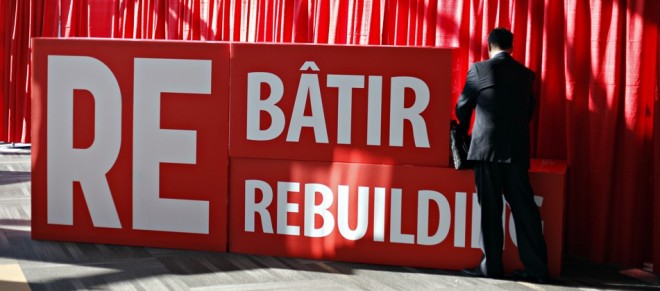The Liberals’ not-so-catchy catch phrase: evidence-based policy
Didn’t somebody once say something about reason over passion?
during the Liberal Biennial Convention in Ottawa January 14, 2012.
Share

The most frequently repeated phrase printed in today’s program at the Liberal party convention here in Ottawa and tossed around in sessions by delegates is “evidence-based policy.”
As a political slogan, it might not have a bright future. But as shorthand for what has emerged as the prevailing criticism of the way the governing Conservatives devise policy, the phrase does the job.
The realization that Stephen Harper’s government doesn’t bother much with assembling evidence to support its main policies started to set soon after he won power in 2006. I didn’t realize how self-conscious the Tories were about brushing off expert opinion, and even dismissing data, until I heard former Harper chief of staff Ian Brodie speak to the subject in 2009.
But it wasn’t until the mid-2010 that the matter of how evidence is marshaled took root as the clearest way of gathering objections to the Tory approach on a whole raft of policies—from crime, to climate change, to taxation—under one, convenient heading. The issue that brought all these disparate elements together: the government’s decision to take aim at the gathering of data itself by scrapping the long-form census. (I wrapped them up here.)
Indeed, the martyr of the census saga, Munir Sheikh, the former chief statistician at Statistics Canada, who resigned over the flap, gave a keynote policy address at the Liberal convention here today.
On Sheikh’s central point, there’s not much room for debate: obviously policy should be based on evidence. But just as obviously, this debate is more politically fraught than that. The Tories have been awfully successful thumbing their noses at criminology research by imposing longer prison terms, scoffing at tax experts by cutting the GST, and ignoring climate researchers by doing little on global warming. It seems a lot of voters don’t care much for evidence either.
Yet the evidence-based policy theme resonates powerfully for Liberals. One key reason is suggests a neat solution to the difficult dilemma of trying to survive as a centrist party. If the New Democrats appeal to the progressive left, the Conservatives the populist right, then the Liberals need a find a way to argue that their centrism isn’t just a boring, tepid, blend of both. Staking out research, logic, data as defining values is a possibility. Didn’t somebody once say something about reason over passion?
“I think a narrative that’s based on the country going in bold places based on honest reflections on evidence is very important,” says Mark Holland, a former Liberal MP who lost his Ontario seat in last spring’s election. “Even if a particular policy position supported strongly by the evidence is way back in the polls, what’s important is a conviction to fight for it until the public sees its truth.”
Recent history suggests the voting public doesn’t readily cooperate in seeing how Liberals interpret the evidence. Copious climate-change data underpinned Stéphane Dion’s “Green Shift” platform in 2008, but it failing miserably to click with voters.
Holland admits Dion’s campaign stands as a cautionary tale. “There was an evidence-based approach there, there were courageous positions taken, but we were never able to connect them with people’s lives and how they were going to improve the country. Getting people emotionally connected is essential.”
Another former Liberal MP, Toronto educator John Godfrey, says the key is to link evidence-based policy with opinion-researched politics. As minister of state for infrastructure and communities in Paul Martin’s short-lived government, Godfrey commissioned a poll on Canadians’ attitudes toward the aim—much beloved by hip urban planners—of building denser cities.
“If you say to a person, ‘Would you like to live in a more dense urban environment?’ they think Calcutta,” Godfrey said. “If you put it, making exactly the same point, ‘Would you like to live in a walkable neighbourhood, in which you could take your kids to school without getting in the car?’ they like it. You’ve put it in a way that’s true, but understandable and compelling.”
Finding experts to tell you what policy is right is easy. Finding political strategist who know how to pitch that policy is hard.
And there’s another question. Even if a party diligently studies the evidence to figure out its platform, and then cleverly persuades the voting public to agree, there remains the matter of actually implementing the plan.
NDP MP Olivia Chow, who attended the Liberal convention today as an observer, says it’s this last part that the Liberals have failed to grapple with over the past couple of decades. On issues like higher education, home care, early childhood policies, Chow allows that the Liberals have some good ideas.
But she argues that their refusal to take a firm stand on transfer payments to the provinces—declaring that a Liberal government would refuse to transfer money to provinces that don’t meeting conditions on post-secondary education, bringing health to homes, and expanding daycare—renders their policies unworkable.
“You need a legislative policy framework, then you have to put conditions on the key principles around transfers,” she says. “In the last twenty years the Liberals haven’t had any serious discussion about how to make their policy reality.”
Evidence-based policy is a solid starting point for discussion, and a handy, ideologically neutral way to differentiate the centrist party’s approach. Put it together with some creative political marketing and a hard-nosed plan for implementing a platform, and the Liberals might actually be onto something.